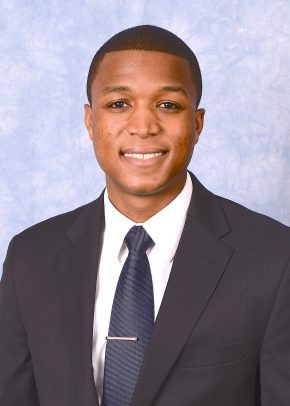Inspiring grads: Joe Bozeman

Before he had even defended his thesis, Joe Bozeman III already was first author on published research studies, interviewed by national publications and an invited speaker at events such as the Field Museum’s “Night of Ideas.”
“Some of the successes came immediately after we began to publish,” said Bozeman, a doctoral student in civil engineering. “I was surprised and taken aback, quite frankly, and it’s been flowing ever since.”
Bozeman was given the opportunity to become first author on his research by his adviser, Thomas Thies, director of the UIC Institute for Environmental Science and Policy.
“I have to give credit to my adviser when it comes to being able to be the face of my own research, because he could have taken the mantle and facilitated a lot of the research, but he’s allowed me to represent the research as the first author on all the publications,” Bozeman said.
Bozeman’s research studies on topics related to energy and environmental sustainability have been featured in major scientific magazines such as Popular Science, in newspapers such as the New York Post, and on NPR.
One study, published in March 2019 in the Journal of Industrial Ecology, found that white Americans disproportionately affect the environment by eating foods that require more water and release more greenhouse gases compared with foods that black and Latino individuals eat. Another study, published in June 2019 in Environmental Engineering Science, found that despite spending less than white households on food overall, black and Latino households have more impact on the environment per dollar spent on food than white households.
“I look at issues of food consumption and socioeconomic and racial groups and how they affect the environment,” Bozeman said. “I pay attention to those differences and come up with public policy proposals that could help alleviate some of those issues. The implications of the research are wide-ranging.
“From a public policy perspective, we can start shaping our behavioral initiatives and changes around this kind of information so that we can be more targeted and effective in our public policy development.”
He faced some criticism on social media for the racial component of his research, which was peer-reviewed and “solid in terms of statistical significance,” he said.
“Race is central to my research. As an African American male, I didn’t anticipate some of the backlash I would receive going down this research path,” he said. “UIC and a host of the academic world really came to back me up when I needed it the most. That helped to alleviate some of the attacks that were coming — and unfounded.”
His love of Captain Planet as a child sparked his initial interest in sustainability, but he became formally engaged in the field during President Obama’s 2008 campaign, when issues of climate change, energy and sustainability became dominant domestic policy concerns for voters.
“I wanted to be part of that,” he said.
Since 2010, Bozeman has worked with the Department of Veteran Affairs. He currently works with the Captain James A. Lovell Federal Health Care Center in North Chicago, overseeing environmental compliance and energy conservation programming.
“It’s been a really great experience,” he said. “I’ve been able to apply my research and develop leadership skills.”
Before joining UIC, Bozeman played Division I basketball at Wright State University, where he completed his undergraduate and master’s degrees.
Since defending his dissertation, Bozeman has been interviewing for assistant professor positions and spending time with his wife, Rayne, who is an assistant professor of psychology at Chicago State University, and his daughter, Dionne, who is 12.
“My wife definitely keeps me on my toes when it comes to my research,” he said. “My daughter is really interested in marine biology so she’s already thinking about college. I’m sure she’s influenced by her parents. I’m very excited about our future.”
